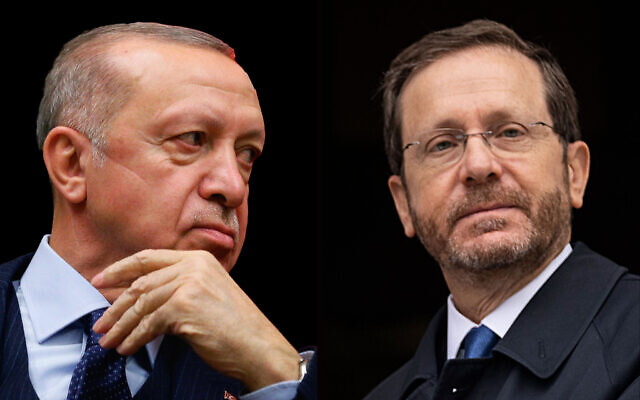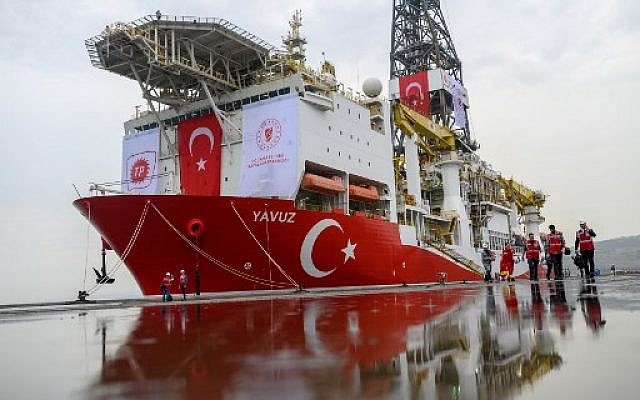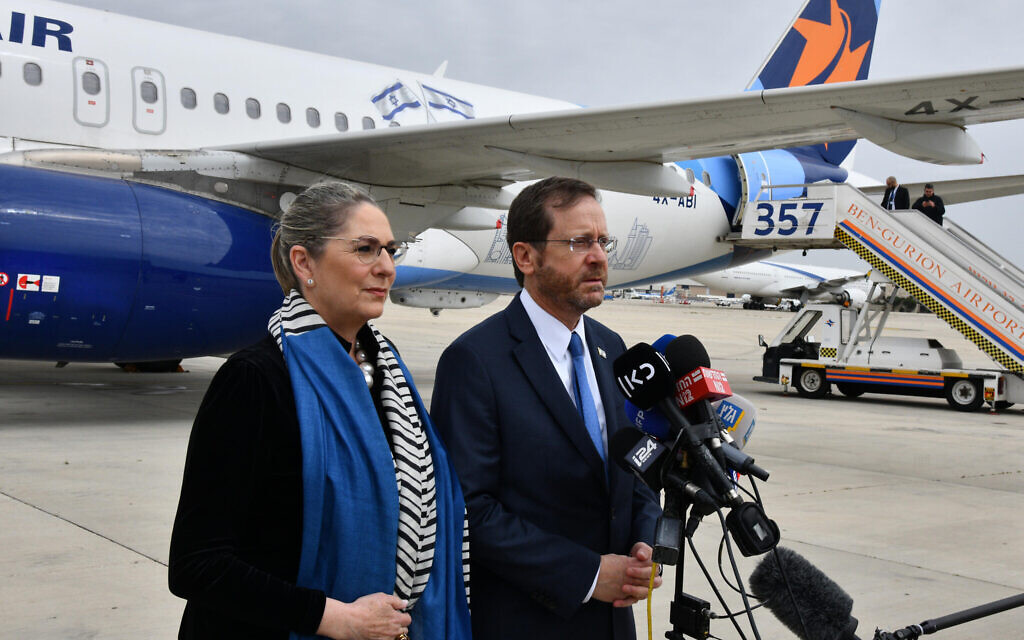Herzog lands in Turkey to ‘restart relations’ as Jerusalem-Ankara ties warm
President Isaac Herzog embarked Wednesday for Turkey, where he will seek to wind the clock back on frigid Jerusalem-Ankara ties during a whirlwind 24-hour visit.
“The relationship with Turkey has had its ups and downs in recent years — we will not agree on everything, but we will try to restart relations,” Herzog said in a statement ahead of his departure.
“Relations between Israel and Turkey are important to Israel, important to Turkey and important to the entire region,” he said.
“Hopefully following my visit, a process of in-depth and serious dialogue with Turkey will begin at various levels, and we will eventually see progress with positive relations and results,” he said, noting that his trip was being made in full coordination with Prime Minister Naftali Bennett and Foreign Minister Yair Lapid.
Herzog’s trip marks the highest-level visit by an Israeli official since former prime minister Ehud Olmert made the trip in 2008, and is seen as an important step toward rekindling the two countries’ relationship.
The president landed in Ankara on Wednesday afternoon and will hold a series of meetings with Turkish President Recep Tayyip Erdogan, who will also host Herzog and his wife, Michal Herzog, for a state dinner.

Recep Tayyip Erdogan, left, and Isaac Herzog. (AP photos, montage)
Analysts believe a successful visit will be a major steppingstone in bringing the bilateral relationship out of deep freeze.
Despite high hopes for a possible diplomatic breakthrough during the meetings, the sides are not slated to discuss or announce the installment of full ambassadors in each others’ capitals, a Foreign Ministry source told The Times of Israel.
Aside from an 18-month détente from late 2016 to mid-2018, Israel has not had a full ambassador in Turkey since 2011, when Ankara expelled Israel’s envoy and recalled its own from Tel Aviv.
That move came in response to Israel’s refusal to apologize for the 2010 raid of the Turkish ship Mavi Marmara as it attempted to breach a naval blockade on Gaza. Ten Turkish citizens died as a result of fighting that broke out during the raid, which also left a number of Israeli troops seriously wounded.
The raid is widely seen as the breaking point of a bilateral relationship that had previously thrived for years. It came after a series of lower-level diplomatic spats over Israel’s policies toward Palestinians and Turkish antisemitism and support for the Palestinian terror group Hamas. Diplomatic ties remained mostly frozen in the intervening decade, though tourism and bilateral trade largely resumed.

Pro-Palestinian Turks set on fire an Israeli flag as they shout slogans to protest Israel’s plans to build new housing in East Jerusalem, in Istanbul, Turkey, Friday, March 19, 2010. (AP/Ibrahim Usta)
While Erdogan and former prime minister Benjamin Netanyahu incessantly attacked each other as terrorists, murderers, genocidaires, and more, the Turkish president has shifted to a less confrontational stance toward Israel in recent months, openly touting the possibility of re-establishing full ties and partnering up to deliver natural gas to Europe.
According to Herzog’s office, talks for a rapprochement were kicked off when Erdogan phoned Herzog in July to congratulate him on being picked president.
In Ankara, the two presidents “will discuss various bilateral issues, including Israel-Turkey relations and the potential for expanding collaboration between their respective states and peoples in various fields,” the President’s Residence said in a statement Tuesday.

Erdogan and Olmert during happier times at the Elysee Palace in Paris, some five months before Operation Cast Lead (Photo credit: Avi Ohayon/ GPO/ Flash 90)
Overshadowing the visit will be the war in Ukraine. On Thursday, Erdogan is slated to host Ukrainian Foreign Minister Dmytro Kuleba and his Russian counterpart Sergey Lavrov in Antalya for the highest-level talks between the countries since the Russian invasion on February 24.
Israel is not involved in the talks, though Bennett has sought a leading role mediating the conflict, meeting with Russian President Vladimir Putin on Saturday and holding several phone calls with Ukrainian President Volodymyr Zelensky.
Herzog is also scheduled to fly to Istanbul for meetings with Jewish community leaders on Wednesday night before returning to Israel Thursday afternoon.
Herzog said he would convey to Erdogan a message of “collaboration between peoples and all faiths for the well-being of humanity.”

A Turkish mother waits with her child at the Israeli field hospital in the town of Adapazari Sunday, August 22, 1999. (AP Photo/Eyal Warshavsky)
In January, Erdogan called Herzog’s planned visit an opportunity to “open a new chapter in relations between Turkey and Israel.”
Both sides remain cautiously optimistic about the chances for fully resuming ties. Israeli officials say they will keep an especially close eye out for any situation that could allow Turkey to catch Herzog off guard and embarrass him.
In 2009, Erdogan angrily lectured then-president Shimon Peres at a World Economic Forum panel in Davos before storming off stage.
Over the past two weeks, Herzog visited Greece and Cyprus to reassure them the rapprochement with Turkey would not undermine Israel’s ties with its Mediterranean neighbors.
Israel had partnered with Greece and Cyprus to build a gas pipeline from the Eastern Mediterranean, but the project has largely stalled since the US pulled support in January. Turkey, which was excluded from the project, had staked its own claims to offshore gas reserves, raising regional tensions.
In February, Erdogan said a possible gas partnership would be on the agenda for Herzog’s visit.

Journalists walk next to the drilling ship ‘Yavuz’ scheduled to search for oil and gas off Cyprus, at the port of Dilovasi, outside Istanbul, on June 20, 2019. (Bulent Kilic/AFP)
“We could use Israeli natural gas in our country, and beyond that, we could also work together to carry it to Europe,” he said on February 4.
Turkey — battered by an economic crisis at home — has been seen taking steps to improve relations with other regional rivals as well, such as the United Arab Emirates.
Earlier this week, Israel hosted a group of 100 businesspeople from Turkey in a bid to bolster trade ties. According to figures presented at a Tel Aviv event for business leaders from both countries, bilateral trade jumped to $6.7 billion in 2021, up 35% over the $4.9 billion generated in 2020, but still down from 2018, when trade neared $8 billion.
Turkish Exporters Assembly chairman Gulle Ismail said the countries were aiming to reach $9 billion in exports to each other in 2022, boosted by the diplomatic tailwind.
“The improvement of our political relations will further strengthen our trade ties,” he told Turkey’s Anadolu news agency. “Regional trade will create a very positive infrastructure for fostering regional politics that are far from war.”



